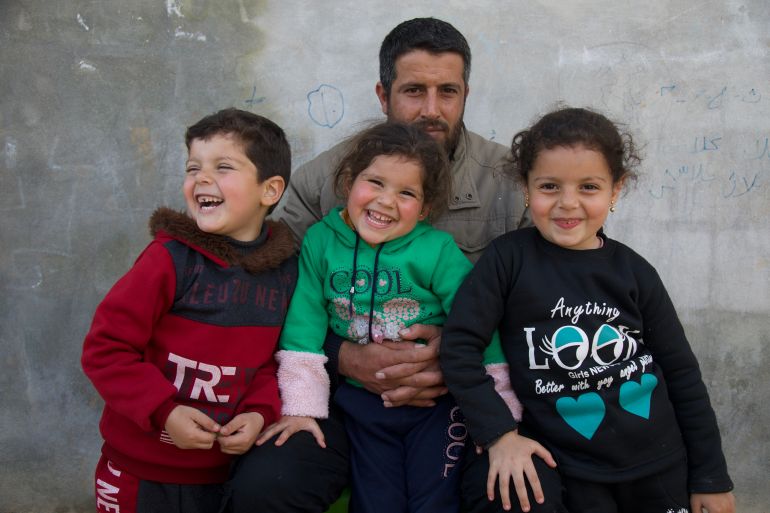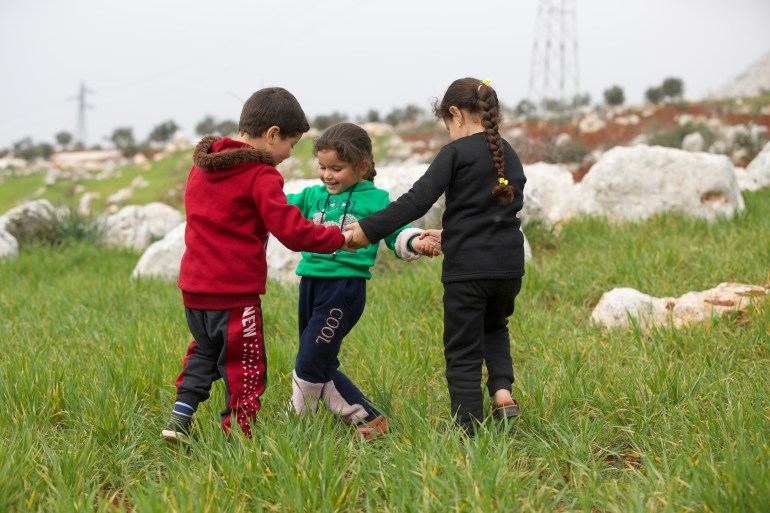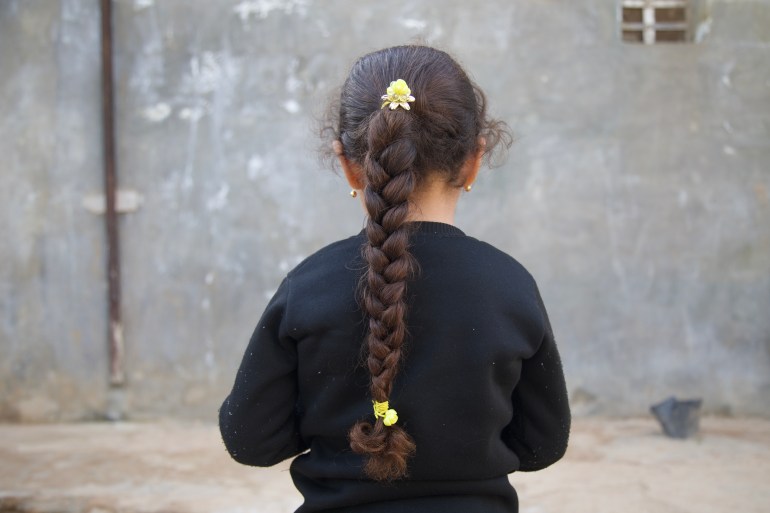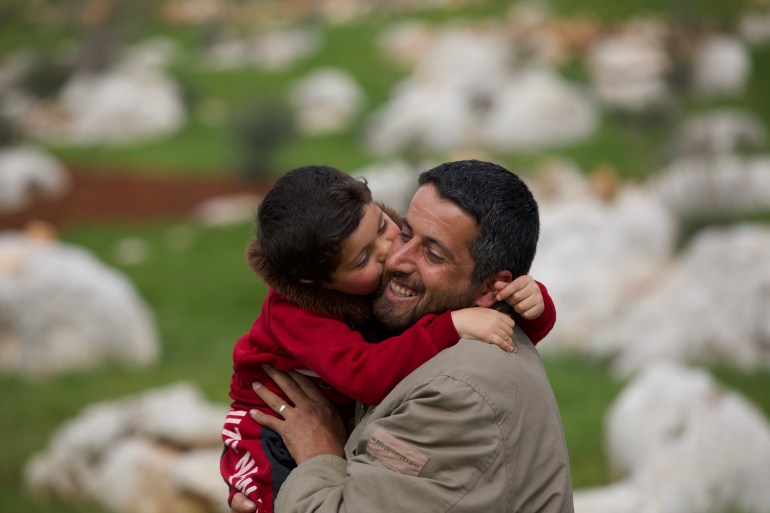Syrian family recounts spending 40 hours under earthquake rubble
The al-Sayed family’s dramatic rescue from under their apartment building was captured in footage that went viral.

Harem, Syria – When rescuers pulled all five members of the al-Sayed family from under the rubble of their quake-damaged apartment building in northwest Syria this month, it was a rare moment of joy.
The rescue took place two days after the devastating 7.6 and 7.4 magnitude quakes struck southern Turkey and northern Syria on February 6, killing more than 50,000 people in both countries.
Keep reading
list of 3 itemsChildren go back to school in NW Syria after devastating quakes
Egypt foreign minister visits Syria for first time since 2011
Hundreds of people witnessed the rescue in person in Besnaya-Bseineh, a town in the Harem district on the Turkish border, and thousands more have viewed the dramatic video footage online. It shows volunteers from the Syrian Civil Defence pulling out Mustafa al-Sayed, his wife, Duaa, and their three children, Maryam, Zuheir and Ilaf.
In the video, the air is filled with the sounds of people yelling and cheering excitedly, their hoarse voices praising God as volunteers retrieved the family one by one.
“Seeing the number of people outside who were involved in rescue operations, … it was such a joyous feeling, knowing that there are still good people in this world willing to risk everything to save a life,” 33-year-old Mustafa said. “I remember smiling once I saw the sky again.”
A true miracle…the sounds of joy embrace the sky… joy beyond belief.
An entire family was rescued from under the rubble of their house this afternoon, Tuesday, February 7, in the village of Bisnia, west of #Idlib.#Syria #earthquake pic.twitter.com/Cb7kXLiMjT— The White Helmets (@SyriaCivilDef) February 7, 2023
The al-Sayeds lived on the first floor of a four-storey apartment complex that had 170 units housing more than 700 people.
When the first quake struck at 4:17am [01:17 GMT], Mustafa and Duaa were jolted awake. They got up from bed to check on their three children sleeping in the adjacent room, but in those 30 seconds, the building collapsed, plunging them into darkness.
“I began shouting, calling for my wife. Thank God she answered me,” Mustafa recounted. “We both started screaming our children’s names, hoping they were alive and near us. Maryam, my six-year-old, was the first to respond, and I can’t begin to explain how happy that made me to hear her voice.”
He then called out for his five-year-old son, Zuheir.
“I shouted, ‘Zuheir, my love, … can you hear me?’ He also responded. I called out for Ilaf, my three-year-old. ‘Where are you, Ilaf?’ Then I heard her tiny voice replying, ‘I’m here, baba’. She was lying beneath her siblings.”
Relieved that his children were alive and nearby, Mustafa then called out for his brother Mohammed, his mother and two sisters.
It was only after he spent four days in thospital after his rescue that he found out they did not survive.
He later learned that the vast majority of the residents living in the same building – about 600 people – were killed.
“My friends and neighbours in the building … entire families, gone,” he said.

The al-Sayeds spent 40 hours under the rubble, trapped beneath the concrete and steel. Mustafa describes the experience as like being inside a coffin.
“My wife and children would sleep and wake up, but the whole time, I stayed conscious, trying to hear any sound of people above us, anyone who could hear us,” he said. “I tried to make noise by repeatedly hitting a rock on the rubble, but it disintegrated in my hand.”
He tried to distract the children, who complained that they were hungry and thirsty.
“I told them to recite their prayers and to sleep. I had no idea whether it was night or day. When they would wake up, I would ask each of them to recite what they had memorised from the Quran.”
Mustafa said he didn’t feel the passage of time. As hours went by, he tried to reach his children, getting closer until his fingers managed to wrap around Ilaf’s hair.
“I couldn’t move my legs, but my arms were free,” he said. “I recognised Maryam after I grabbed her long hair. The children were stuck, so I began taking bits and pieces of the rubble that were on top of them and putting it over myself. I wanted them to live. Maryam broke her leg because it was caught between the steel rods, but she never cried.”

Ilaf interrupts her father.
“My parents were screaming for people to save us. They were very loud, and it bothered me,” she said. “I was cold. But when I got out, I saw light! Everyone was cheering for me. … They rescued Maryam first, then Zuheir, then me, then my mother, then my father.”
This wasn’t Mustafa’s first time trapped under rubble. A few years ago, when he was in his hometown of Maarat al-Numan, which is also in Idlib province, a Syrian regime plane targeted a two-storey building he was in with friends. He was rescued three hours later.
“This time, with your wife and children, it was much more terrifying,” he said.
The family are now homeless. Duaa and the children are staying with her side of the family while Mustafa and his father are sleeping in their car in Salqeen.
The United Nations estimates 8.8 million people have been affected by the quakes in Syria and said more than 5,800 Syrians have been killed.
According to Syria’s Civil Defence, 2,274 people died in the opposition-held northwest and more than 12,400 were injured.
Mustafa worries how much his children will be affected by the experience of being buried alive for almost two days.
“Maryam still suffers psychologically,” he said. “I took her to see the rubble of our building, and she became physically sick. We’re all traumatised. If I enter a place with a roof above me, I lose feeling in my legs.”
He says that after witnessing the destruction at the building where his family lived, his relatives had prepared headstones.
“They thought it was impossible that anyone could survive that,” he said. “It’s truly a miracle.”

Additional reporting by Linah Alsaafin.